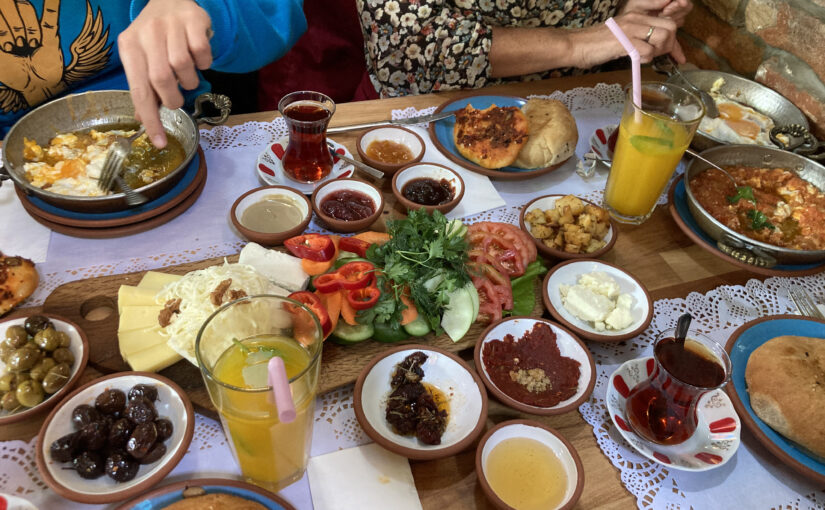Field of study in Wageningen: Landscape Architecture and Spatial Planning
Study period exchange: 10/09/2022 – 15/01/2023
Country (exchange): Turkey
City (exchange): Istanbul
University (exchange): Istanbul Technical University
Faculty (exchange): Faculty of Architecture
2. Motivation for exchange
Why did you choose to go on study exchange?
I realised that I wanted to broaden my view and wanted to learn more about the different perspectives of city and rural planning in another country with other cultural influences. I also liked to go an abroad and the Erasmus programme was a good opportunity to do this.
What is the reason you chose for this country/university?
I was interested in the city planning of Istanbul. Istanbul is a big city located in Europe and Asia and consists of many old and new neighbourhoods. Besides that, I also liked to learn more about Turkey and Istanbul self. I have always been interested in discovering different countries, cities, and cultures. Istanbul has a rich history, it is affected by the modern western world, but influences of earlier cultures and people are still visible and cause a very varied city view. I wanted to experience how it is to live in a metropolis like Istanbul and practice my urban planning knowledge in real life.
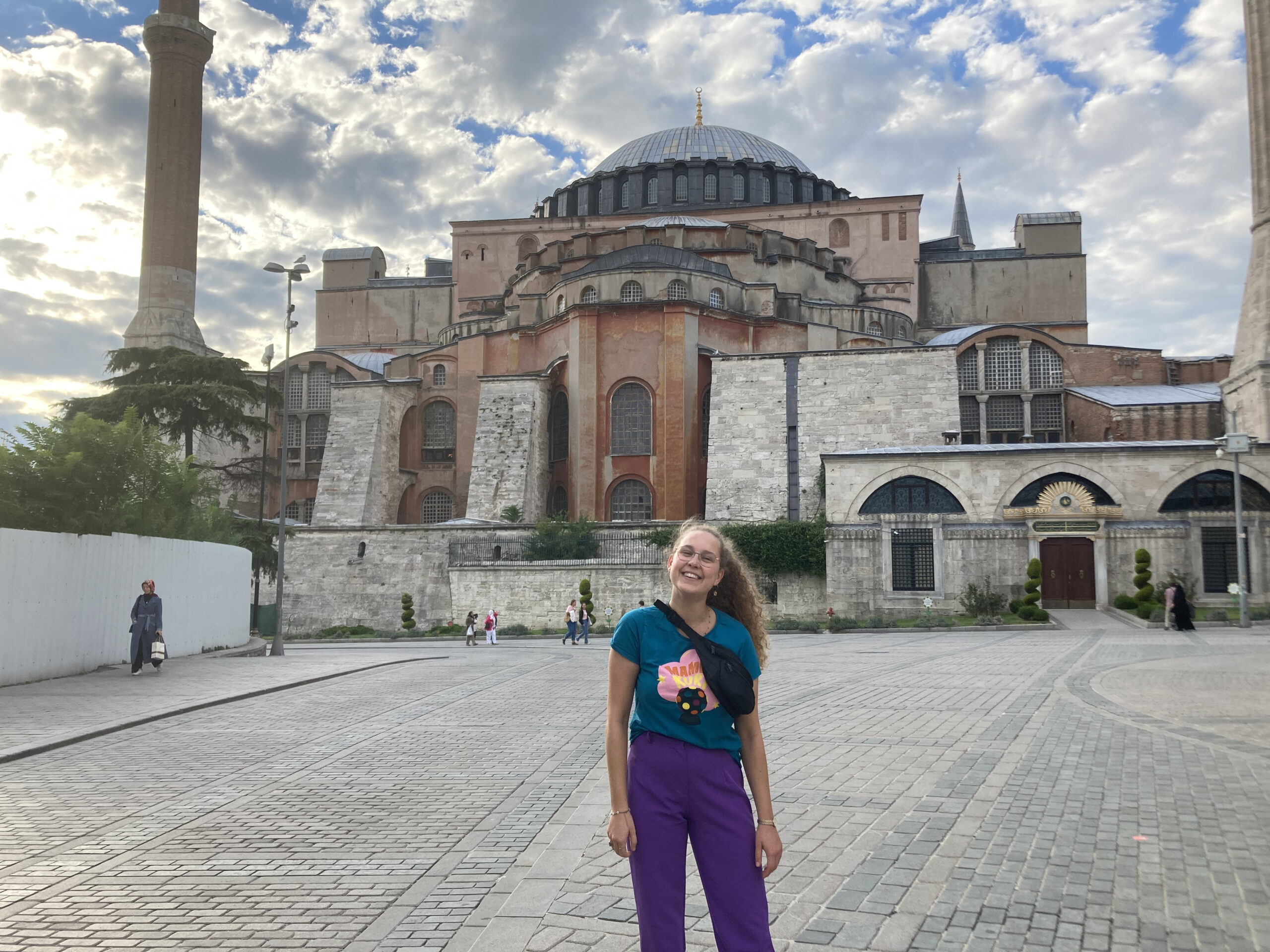
3. Accessibility to reach destination
Do you have any tips to reach your exchange destination?
I travelled towards Istanbul by plane in September. I travelled to Sabiha Gokcen Airport (on the Asian side). Travelling to the European centrum takes from both the airports about the same time, however tickets towards flight tickets towards the Asian airport are normally cheaper. It is nice to be there a bit in front of the first days of university because of activities organized by the ESN. I travelled back to the Netherlands by train and plane, because I made a trip through Europe. I travelled with the nighttrain from Istanbul to Sofia, which was quite nice.
4. University and studying
Could you provide some general information about the followed courses?
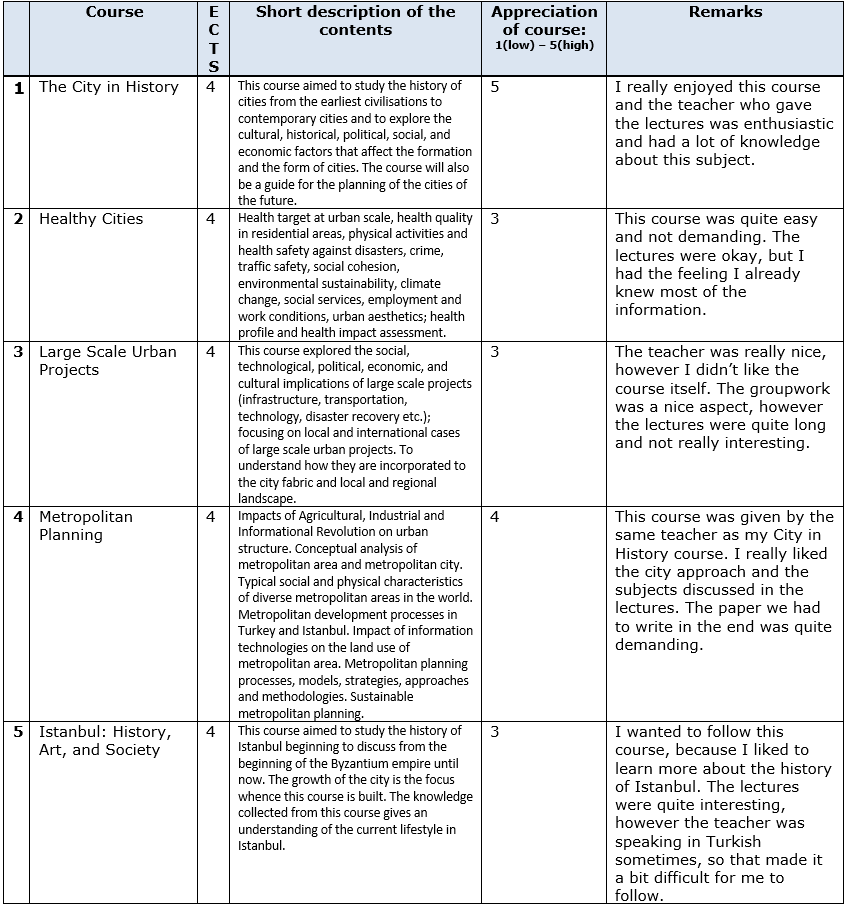 How is the study formalized?
How is the study formalized?
At the ITU the study programme is a bit different organized. The exams are at the end of the semester and the courses you are following are given one or two times a week. I had to get used to this in the beginning, because in Wageningen you are only focusing on one or two courses per period. However, because of this structure the workload per course was doable, despite the fact that the lectures itself were quite long. I was quite surprised about the level because I think most of the courses I followed were at a quite high level. You had to plan the groupwork yourself, that was sometimes quite a challenge, because everyone was following other courses at other times.
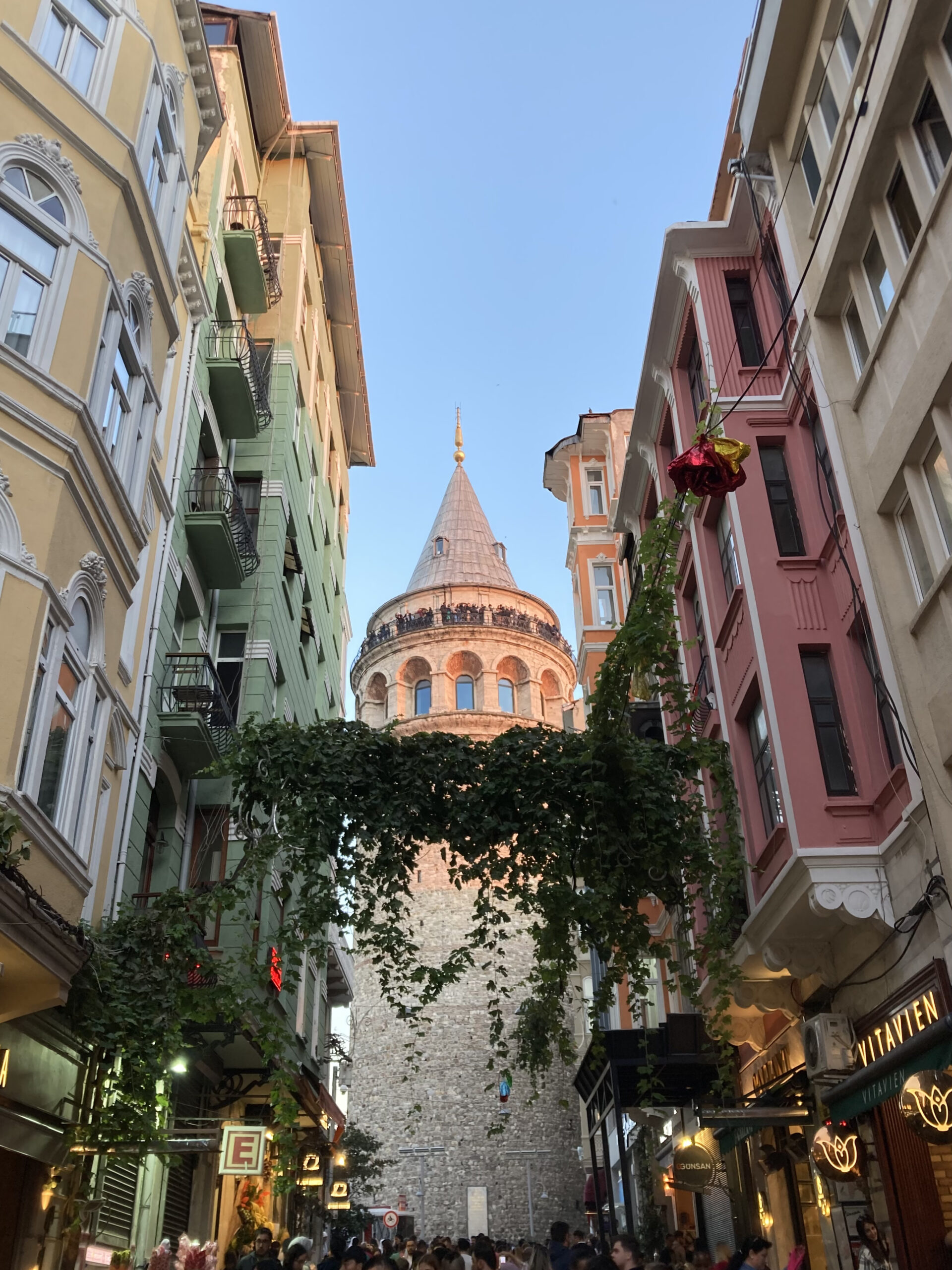
What is the culture of the university?
The teachers were really concerned and interested in the international students and felt most of the time honoured when we were wanting to follow their courses. I choose to do only theoretical courses, so about the studio courses I do not really have an opinion, only know some stories from other international students about how this was structured and the accompaniment.
What does the university offer the student additionally?
The ESN of the ITU was active and especially in the beginning this was a nice way to get to know other international students, also from other faculties. I think in total there were about 200 international students from all over Europe, so that was nice. The ESN was organizing about two activities a week and trips to some places in Türkiye. The university itself offered also quite some sports- and activity clubs you can join. I decided I did not want to join a club, but I heard quite some nice stories about these.
5. Housing-travelling-living
What are the possibilities for housing?
Finding a room when I was still in the Netherlands was quite difficult. So, I decided to rent an Airbnb for the first month and I’m glad I made this decision. In the first month, I got to know lots of people and via them I found my permanent room. I liked that I did it this way, because in the first month I could find out where I wanted to live and what other preconditions I had for my permanent stay. I stayed close to the European centrum and because my faculty was close to this centrum, my location was ideal.
What is the culture of the country like?
The culture was really amazing, especially the habit to go out the get some food 😉. I think because Istanbul is such a big global city, the culture shock, even though it is a Muslim country, wasn’t that big. I really like being in and exploring another culture. And I think Istanbul was great for this. For me the biggest thing which I had to get to used to was just being in such a big city with all its habitants. Being on the streets, you see so many tourists as well, especially in the city centres. One thing that stood out is that you see more men on the streets that women, but despite this fact I haven’t felt unsafe. The beauty of the Muslim culture, like the mosques and other different architectural buildings and places, and the going-out-for-dinner-culture was something I really liked.
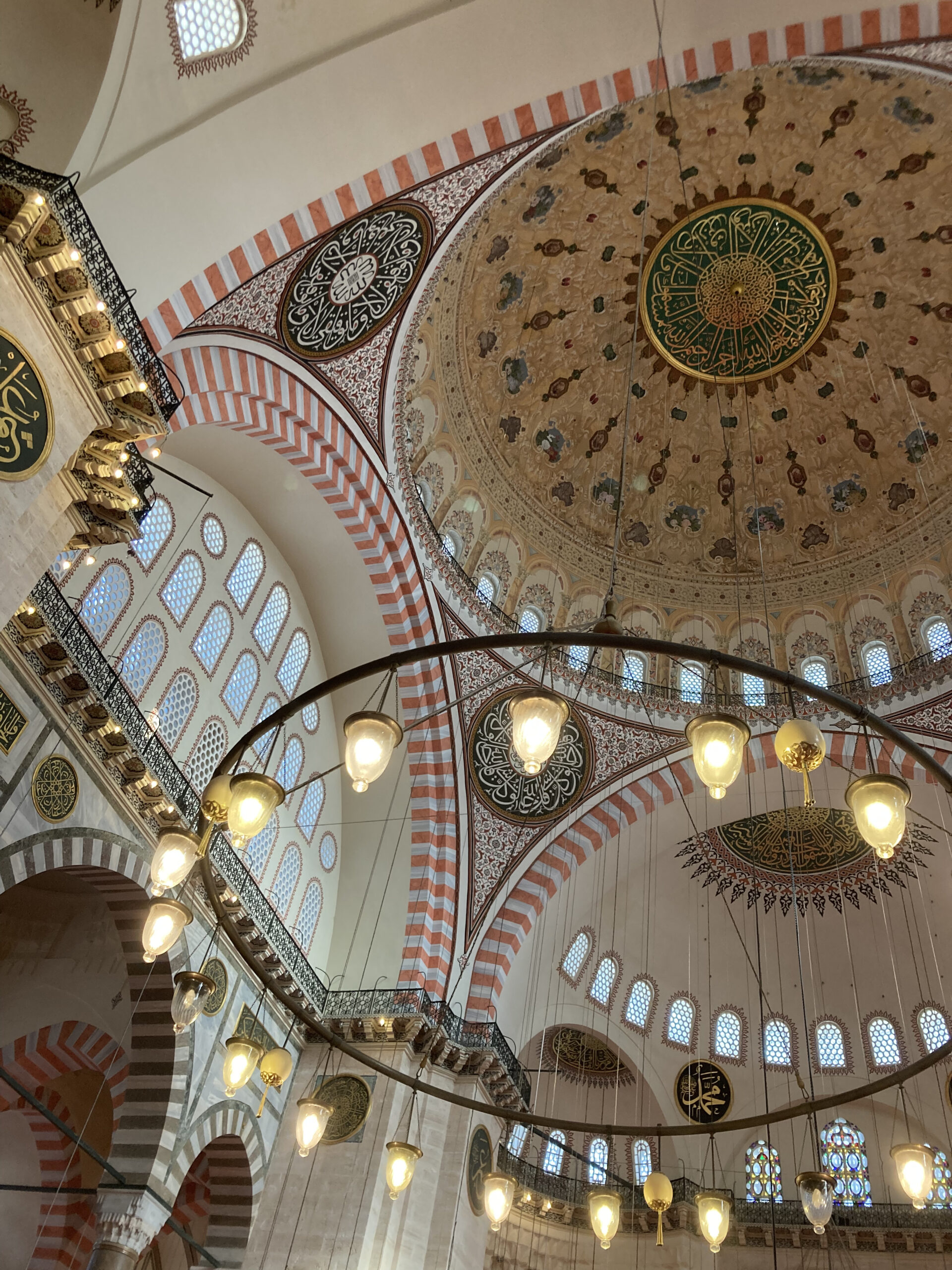
Could you give a general price indication of the place of residence compared to living in Wageningen?
My rent was about 330 euros a month including gas, water, internet, and I even had a cleaning lady 😉. I shared my apartment with three other girls. I heard from other students that they paid about the same prices. However, the rents are rising as well in Istanbul.
Could you give some information about public transport infrastructure?
I was travelling with the metro lines a lot and these were quite convenient. At daytime they were driving every five minutes in the European centrum and at night-time every 15 minutes. In the weekends they were driving the whole night. Because the traffic at the roads is quite dense, taking the busses is not recommended. I travelled with a special student Istanbul urban transportation card, with which I could travel a whole month for about 5-10 euros. You can get this card when you are registered at the university, so the first weeks I travelled with the tourist card. You can get this card at the vending machines in the metro stations and these rides where not that expensive. Next to taking the metro, I was walking a lot, but the times at Google Maps are not always reliable, because Istanbul is located at seven hills, so your route can be quite steep sometimes.
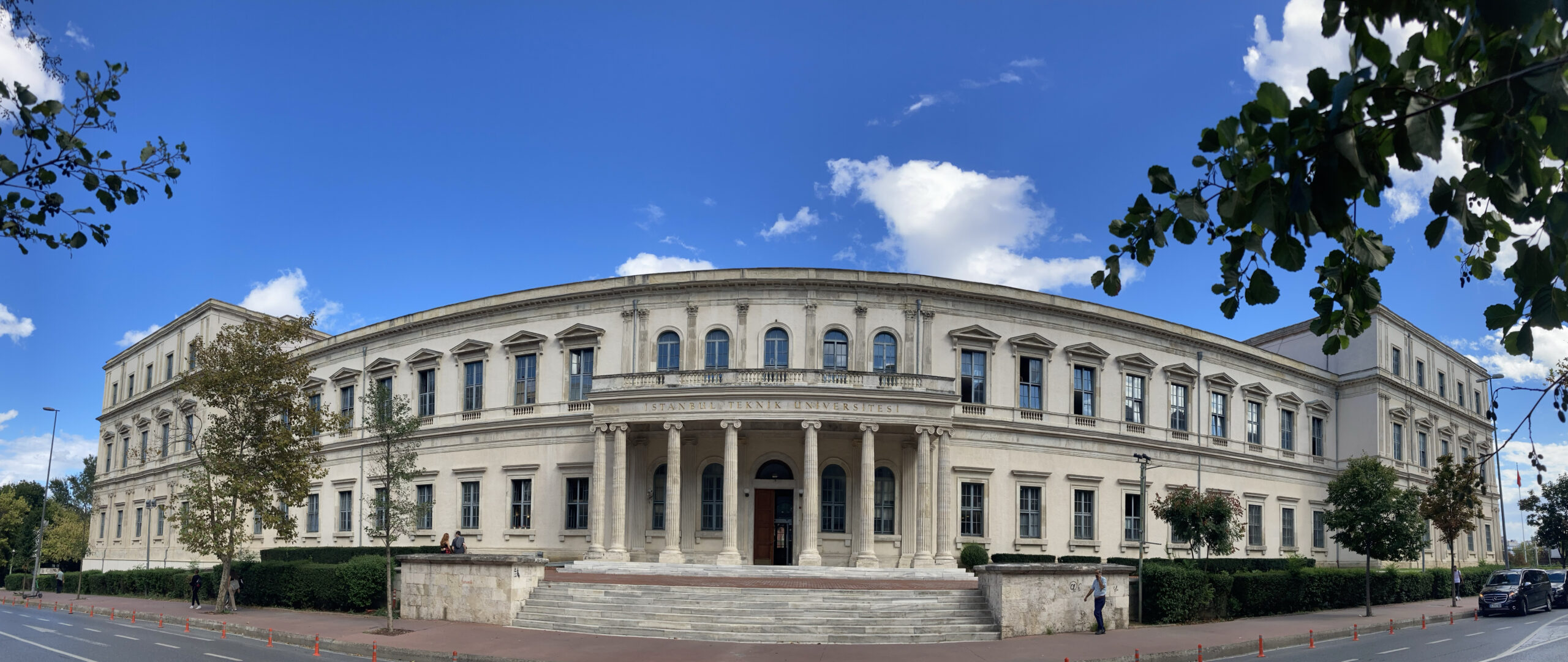
6. Free time
What are must-sees in the area?
Just looking at Istanbul itself, there are already lots of thing to see or visit. Think for example of all the different mosques. You can visit them for free, and all of them have another beautiful interior and it’s like being in a calm place within the crowded city. One thing which is recommended when visiting the city is to bring a headscarf with you. Not only the bigger mosques, like the Aya Sofia (visit this one at night time, because then it is way calmer) or the Blue Mosque, but also all the other smaller mosques are worth a visit. Next to the mosques, also the Topkapi and Dolmabahce palace are worth a visit. Istanbul consists of many different districts and every district has its own identity, think of Balat, Fatih, Besiktas, Ortakoy, Uskudar or the main centres Taksim and at the Asian side Kadikoy. Going with the ferry to the other side is really worth travelling, especially at sunrise or sunset. If you want to visit greener areas, going to the Princess Islands by ferry is a nice thing to do or visit one of the coastal areas or green parks. Also visiting other cities in Türkiye or touristic places (for example organized by the ESN) or other parts of the country is worth doing when you have the time, because it really is a beautiful and diverse country.
What does not appear in the travel guide, but is worth a visit?
Look for a more extended answer at the question above. But especially visiting the Aya Sofia at night time, going to other different districts than the centres, and visiting other places in Türkiye itself are tips.
Do you have general tips and tricks about leisure time?
I really have a lot of tips saved at my Google Maps. So, when you are really going abroad to Istanbul, feel free to contact me 😊 But in general, really take advantage of the cheap and delicious restaurants!
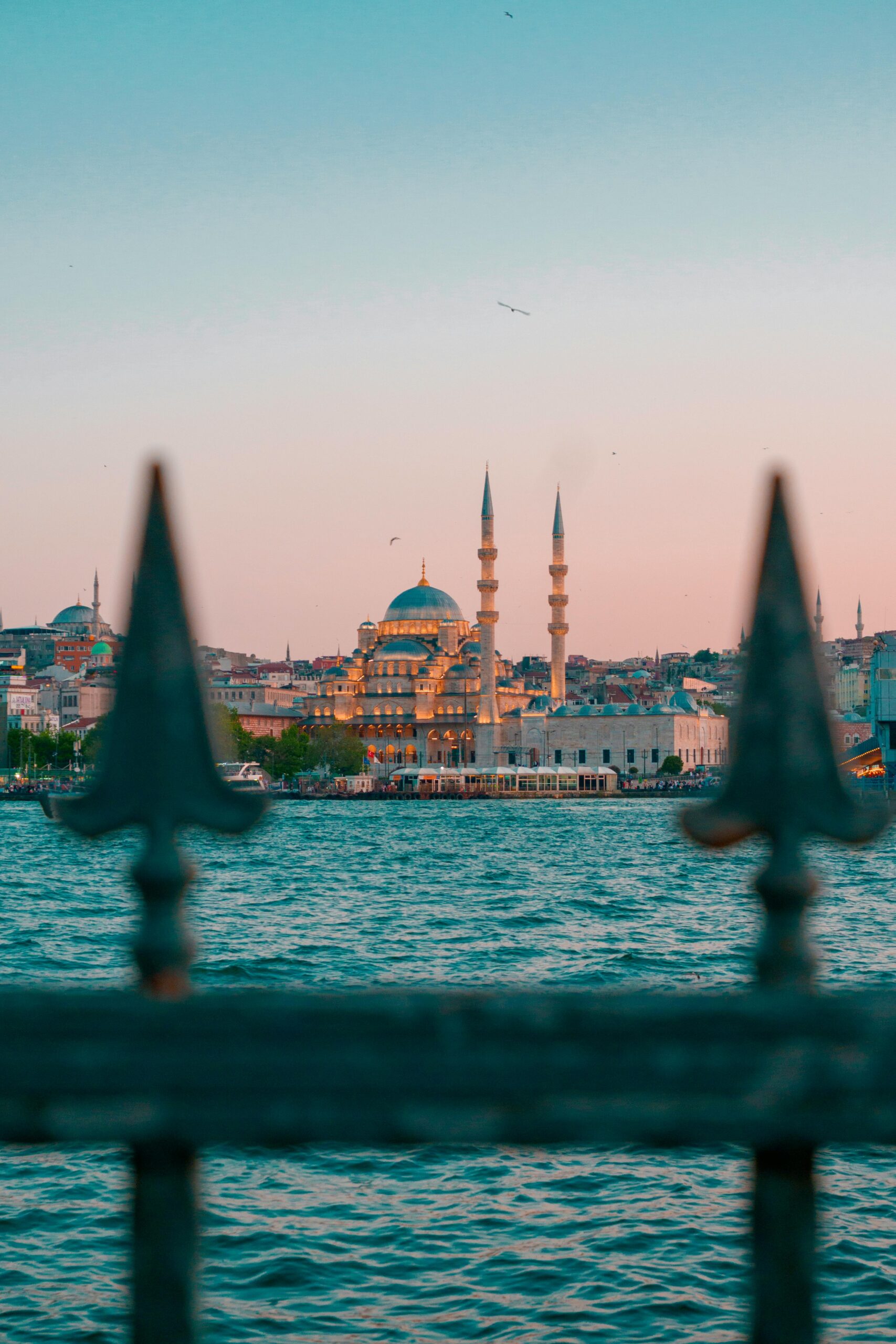
7. Challenges & best moment abroad
What was a challenge you have experienced?
The biggest challenge for me was being away from my family and friends. It sounds like a cliché, but when my family was visiting me, I really felt more at home in Istanbul afterwards. Istanbul is really another place than Wageningen and when talking about it with other people, not everyone knows how it is and has a picture of living over there. I got to know many people and especially when you get to know each other better this contributes at feeling more at home 😊.
What was your best memory abroad?
I think my best memory from my abroad experience was experiencing another culture and especially the going-out-for-dinner-culture was really something I enjoyed. However, my best experience was when we were visiting some country sides and touristic areas in Türkiye when we were going on a trip with the ESN. This specific weekend was my first weekend out of Istanbul, and I really enjoyed the calmness of being out of Istanbul, this was also the moment I realised I’m not a city person 😉. Despite this fact, I really liked living for half a year in Istanbul and I really think it contributes at my view of being a planner (I’m studying spatial planning in Wageningen). The best moment of this weekend was when we were having the opportunity to go paragliding, this was really one of the most amazing things I ever did.
8. Contact Details
Would you like to ask Anne more questions about her exchange?
Send her a mail: anne.vandervelde@wur.nl

